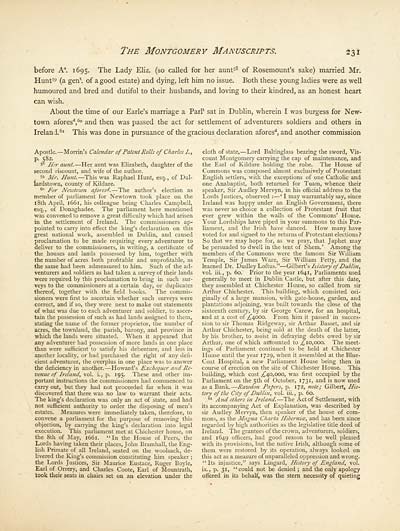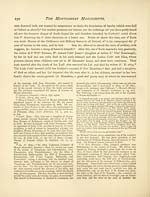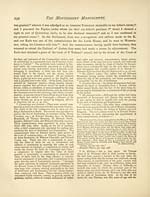Montgomery manuscripts
(245) Page 231
Download files
Complete book:
Individual page:
Thumbnail gallery: Grid view | List view

The Montgomery Manuscripts.
231
before A°. 1695. The Lady Eliz. (so called for her aunt 58 of Rosemount's sake) married Mr.
Hunt 59 (a gen', of a good estate) and dying, left him no issue. Both these young ladies were as well
humoured and bred and dutiful to their husbands, and loving to their kindred, as an honest heart
can wish.
About the time of our Earle's marriage a Pari 1 sat in Dublin, wherein I was burgess for New-
town afores d , 6 ° and then was passed the act for settlement of adventurers soldiers and others in
Ireland. 61 This was done in pursuance of the gracious declaration afores d , and another commission
Apostle. — Morrin's Calendar of Patent Rolls of Charles I.,
p. 582.
58 ft j r aunt. — Her aunt was Elizabeth, daughter of the
second viscount, and wife of the author.
5' Mr. Hunt. — This was Raphael Hunt, esq., of Dul-
lardstown, county of Kildare.
60 For Neiotoiun aforesi. — The author's election as
member of parliament for Newtown took place on the
18th April, 1661, his colleague being Charles Campbell,
esq., of Donaghadee. The parliament here mentioned
was convened to remove a great difficulty which had arisen
in the settlement of Ireland. The commissioners ap-
pointed to carry into effect the king's declaration on this
great national work, assembled in Dublin, and caused
proclamation to be made requiring every adventurer to
deliver to the commissioners, in writing, a certificate of
the houses and lands possessed by him, together with
the number of acres both profitable and unprofitable, as
the same had been admeasured to him. Such of the ad-
venturers and soldiers as had taken a survey of their lands
were required by this proclamation to bring in such sur-
veys to the commissioners at a certain day, or duplicates
thereof, together with the field books. The commis-
sioners were first to ascertain whether such surveys were
correct, and if so, they were next to make out statements
of what was due to each adventurer and soldier, to ascer-
tain the possession of such as had lands assigned to them,
stating the name of the former proprietor, the number of
acres, the townland, the parish, barony, and province in
which the lands were situated. When it appeared that
any adventurer had possession of more lands in one place
than were sufficient to satisfy his debenture, and less in
another locality, or had purchased the right of any defi-
cient adventurer, the overplus in one place was to answer
the deficiency in another. — Howard's Exchequer and Re-
venue of Ireland, vol. i., p. 195. These and other im-
portant instructions the commissioners had commenced to
carry out, but they had not proceeded far when it was
discovered that there was no law to warrant their acts.
The king's declaration was only an act of state, and had
not sufficient authority to order the disposing of men's
estates. Measures were immediately taken, therefore, to
convene a parliament for the purpose of removing this
objection, by carrying the king's declaration into legal
execution. This parliament met at Chichester house, on
the 8th of May, 1661. "In the House of Peers, the
Lords having taken their places, John Bramhall, the Eng-
lish Primate of all Ireland, seated on the woolsack, de-
livered the King's commission constituting him speaker ;
the Lords Justices, Sir Maurice Eustace, Roger Boyle,
Earl of Orrery, and Charles Coote, Earl of Mountrath,
took their seats in chairs set on an elevation under the
cloth of state, — Lord Baltinglass bearing the sword, Vis-
count Montgomery carrying the cap of maintenance, and
the Earl of Kildare holding the robe. The House of
Commons was composed almost exclusively of Protestant
English settlers, with the exceptions of one Catholic and
one Anabaptist, both returned for Tuam, whence their
speaker, Sir Audley Mervyn, in his official address to the
Lords Justices, observed : — ' I may warrantably say, since
Ireland was happy under an English Government, there
was never so choice a collection of Protestant fruit that
ever grew within the walls of the Commons' House.
Your Lordships have piped in your summons to this Par-
liament, and the Irish have danced. How many have
voted for and signed to the returns of Protestant elections?
So that we may hope for, as we pray, that Japhet may
be persuaded to dwell in the tent of Shem. ' Among the
members of the Commons were the famous Sir William
Temple, Sir James Ware, Sir William Petty, and the
learned Dr. Dudley Loftus." — Gilbert's h istory of Dublin,
vol. iii. , p. 60. Prior to the year 1 64 1, Parliaments used
generally to meet in Dublin Castle, but after this date,
they assembled at Chichester House, so called from sir
Arthur Chichester. This building, which consisted ori-
ginally of a large mansion, with gate-house, garden, and
plantations adjoining, was built towards the close of the
sixteenth century, by sir George Carew, for an hospital,
and at a cost of £4000. From him it passed in succes-
sion to sir Thomas Ridgeway, sir Arthur Basset, and sir
Arthur Chichester, being sold at the death of the latter,
by his brother, to assist in defraying debts owed by sir
Arthur, one of which amounted to ^10,000. The meet-
ings of Parliament continued to be held at Chichester
House until the year 1729, when it assembled at the Blue-
Coat Hospital, a new Parliament House being then in
course of erection on the site of Chichester House. This
building, which cost .£40,000, was first occupied by the
Parliament on the 5th of October, 1 731, and is now used
as a Bank. — Razudon Papers, p. 172, note; Gilbert, His-
tory of the City of Dublin, vol. iii., p. 60.
61 And others in Ireland. — The Act of Settlement, with
its accompanying Act of Explanation, was described by
sir Audley Mervyn, then speaker of the house of com-
mons, as the Magna Charta Hibernia:, and has been since
regarded by high authorities as the legislative title deed of
Ireland. The grantees of the crown, adventurers, soldiers,
and 1649 officers, had good reason to be well pleased
with its provisions, but the native Irish, although some of
them were restored by its operation, always looked on
this act as a measure of unparalleled oppression and wrong.
"Its injustice," says Lingard, History of England, vol.
ix., p. 31, "could not be denied ; and the only apology
offered in its behalf, was the stern necessity of quieting
231
before A°. 1695. The Lady Eliz. (so called for her aunt 58 of Rosemount's sake) married Mr.
Hunt 59 (a gen', of a good estate) and dying, left him no issue. Both these young ladies were as well
humoured and bred and dutiful to their husbands, and loving to their kindred, as an honest heart
can wish.
About the time of our Earle's marriage a Pari 1 sat in Dublin, wherein I was burgess for New-
town afores d , 6 ° and then was passed the act for settlement of adventurers soldiers and others in
Ireland. 61 This was done in pursuance of the gracious declaration afores d , and another commission
Apostle. — Morrin's Calendar of Patent Rolls of Charles I.,
p. 582.
58 ft j r aunt. — Her aunt was Elizabeth, daughter of the
second viscount, and wife of the author.
5' Mr. Hunt. — This was Raphael Hunt, esq., of Dul-
lardstown, county of Kildare.
60 For Neiotoiun aforesi. — The author's election as
member of parliament for Newtown took place on the
18th April, 1661, his colleague being Charles Campbell,
esq., of Donaghadee. The parliament here mentioned
was convened to remove a great difficulty which had arisen
in the settlement of Ireland. The commissioners ap-
pointed to carry into effect the king's declaration on this
great national work, assembled in Dublin, and caused
proclamation to be made requiring every adventurer to
deliver to the commissioners, in writing, a certificate of
the houses and lands possessed by him, together with
the number of acres both profitable and unprofitable, as
the same had been admeasured to him. Such of the ad-
venturers and soldiers as had taken a survey of their lands
were required by this proclamation to bring in such sur-
veys to the commissioners at a certain day, or duplicates
thereof, together with the field books. The commis-
sioners were first to ascertain whether such surveys were
correct, and if so, they were next to make out statements
of what was due to each adventurer and soldier, to ascer-
tain the possession of such as had lands assigned to them,
stating the name of the former proprietor, the number of
acres, the townland, the parish, barony, and province in
which the lands were situated. When it appeared that
any adventurer had possession of more lands in one place
than were sufficient to satisfy his debenture, and less in
another locality, or had purchased the right of any defi-
cient adventurer, the overplus in one place was to answer
the deficiency in another. — Howard's Exchequer and Re-
venue of Ireland, vol. i., p. 195. These and other im-
portant instructions the commissioners had commenced to
carry out, but they had not proceeded far when it was
discovered that there was no law to warrant their acts.
The king's declaration was only an act of state, and had
not sufficient authority to order the disposing of men's
estates. Measures were immediately taken, therefore, to
convene a parliament for the purpose of removing this
objection, by carrying the king's declaration into legal
execution. This parliament met at Chichester house, on
the 8th of May, 1661. "In the House of Peers, the
Lords having taken their places, John Bramhall, the Eng-
lish Primate of all Ireland, seated on the woolsack, de-
livered the King's commission constituting him speaker ;
the Lords Justices, Sir Maurice Eustace, Roger Boyle,
Earl of Orrery, and Charles Coote, Earl of Mountrath,
took their seats in chairs set on an elevation under the
cloth of state, — Lord Baltinglass bearing the sword, Vis-
count Montgomery carrying the cap of maintenance, and
the Earl of Kildare holding the robe. The House of
Commons was composed almost exclusively of Protestant
English settlers, with the exceptions of one Catholic and
one Anabaptist, both returned for Tuam, whence their
speaker, Sir Audley Mervyn, in his official address to the
Lords Justices, observed : — ' I may warrantably say, since
Ireland was happy under an English Government, there
was never so choice a collection of Protestant fruit that
ever grew within the walls of the Commons' House.
Your Lordships have piped in your summons to this Par-
liament, and the Irish have danced. How many have
voted for and signed to the returns of Protestant elections?
So that we may hope for, as we pray, that Japhet may
be persuaded to dwell in the tent of Shem. ' Among the
members of the Commons were the famous Sir William
Temple, Sir James Ware, Sir William Petty, and the
learned Dr. Dudley Loftus." — Gilbert's h istory of Dublin,
vol. iii. , p. 60. Prior to the year 1 64 1, Parliaments used
generally to meet in Dublin Castle, but after this date,
they assembled at Chichester House, so called from sir
Arthur Chichester. This building, which consisted ori-
ginally of a large mansion, with gate-house, garden, and
plantations adjoining, was built towards the close of the
sixteenth century, by sir George Carew, for an hospital,
and at a cost of £4000. From him it passed in succes-
sion to sir Thomas Ridgeway, sir Arthur Basset, and sir
Arthur Chichester, being sold at the death of the latter,
by his brother, to assist in defraying debts owed by sir
Arthur, one of which amounted to ^10,000. The meet-
ings of Parliament continued to be held at Chichester
House until the year 1729, when it assembled at the Blue-
Coat Hospital, a new Parliament House being then in
course of erection on the site of Chichester House. This
building, which cost .£40,000, was first occupied by the
Parliament on the 5th of October, 1 731, and is now used
as a Bank. — Razudon Papers, p. 172, note; Gilbert, His-
tory of the City of Dublin, vol. iii., p. 60.
61 And others in Ireland. — The Act of Settlement, with
its accompanying Act of Explanation, was described by
sir Audley Mervyn, then speaker of the house of com-
mons, as the Magna Charta Hibernia:, and has been since
regarded by high authorities as the legislative title deed of
Ireland. The grantees of the crown, adventurers, soldiers,
and 1649 officers, had good reason to be well pleased
with its provisions, but the native Irish, although some of
them were restored by its operation, always looked on
this act as a measure of unparalleled oppression and wrong.
"Its injustice," says Lingard, History of England, vol.
ix., p. 31, "could not be denied ; and the only apology
offered in its behalf, was the stern necessity of quieting
Set display mode to:
![]() Universal Viewer |
Universal Viewer | ![]() Mirador |
Large image | Transcription
Mirador |
Large image | Transcription
Images and transcriptions on this page, including medium image downloads, may be used under the Creative Commons Attribution 4.0 International Licence unless otherwise stated. ![]()
| Histories of Scottish families > Montgomery manuscripts > (245) Page 231 |
|---|
| Permanent URL | https://digital.nls.uk/95235867 |
|---|
| Description | A selection of almost 400 printed items relating to the history of Scottish families, mostly dating from the 19th and early 20th centuries. Includes memoirs, genealogies and clan histories, with a few produced by emigrant families. The earliest family history goes back to AD 916. |
|---|

